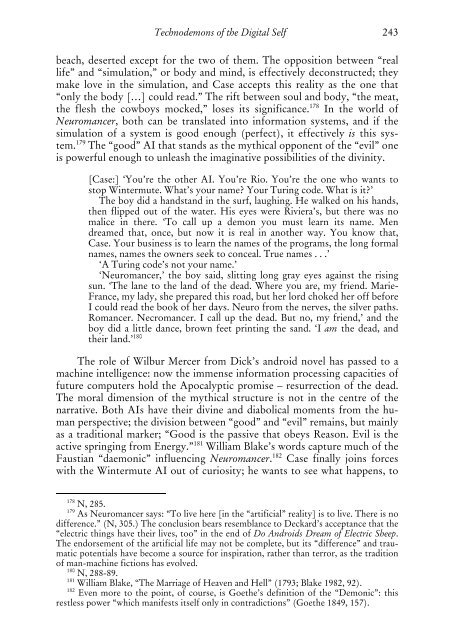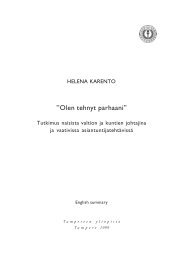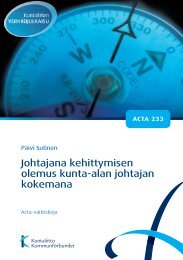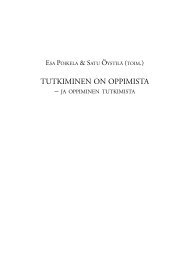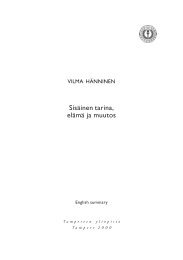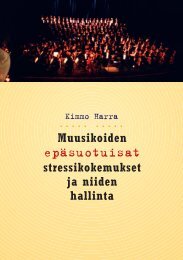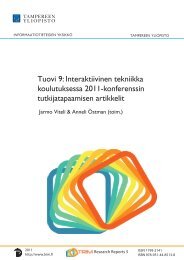Note on this edition: this is an electronic version of the 1999 book ...
Note on this edition: this is an electronic version of the 1999 book ...
Note on this edition: this is an electronic version of the 1999 book ...
You also want an ePaper? Increase the reach of your titles
YUMPU automatically turns print PDFs into web optimized ePapers that Google loves.
Technodem<strong>on</strong>s <strong>of</strong> <strong>the</strong> Digital Self 243beach, deserted except for <strong>the</strong> two <strong>of</strong> <strong>the</strong>m. The oppositi<strong>on</strong> between “reallife” <strong>an</strong>d “simulati<strong>on</strong>,” or body <strong>an</strong>d mind, <strong>is</strong> effectively dec<strong>on</strong>structed; <strong>the</strong>ymake love in <strong>the</strong> simulati<strong>on</strong>, <strong>an</strong>d Case accepts <strong>th<strong>is</strong></strong> reality as <strong>the</strong> <strong>on</strong>e that“<strong>on</strong>ly <strong>the</strong> body […] could read.” The rift between soul <strong>an</strong>d body, “<strong>the</strong> meat,<strong>the</strong> flesh <strong>the</strong> cowboys mocked,” loses its signific<strong>an</strong>ce. 178 In <strong>the</strong> world <strong>of</strong>Neurom<strong>an</strong>cer, both c<strong>an</strong> be tr<strong>an</strong>slated into informati<strong>on</strong> systems, <strong>an</strong>d if <strong>the</strong>simulati<strong>on</strong> <strong>of</strong> a system <strong>is</strong> good enough (perfect), it effectively <strong>is</strong> <strong>th<strong>is</strong></strong> system.179 The “good” AI that st<strong>an</strong>ds as <strong>the</strong> mythical opp<strong>on</strong>ent <strong>of</strong> <strong>the</strong> “evil” <strong>on</strong>e<strong>is</strong> powerful enough to unleash <strong>the</strong> imaginative possibilities <strong>of</strong> <strong>the</strong> divinity.[Case:] ‘You’re <strong>the</strong> o<strong>the</strong>r AI. You’re Rio. You’re <strong>the</strong> <strong>on</strong>e who w<strong>an</strong>ts tostop Wintermute. What’s your name? Your Turing code. What <strong>is</strong> it?’The boy did a h<strong>an</strong>dst<strong>an</strong>d in <strong>the</strong> surf, laughing. He walked <strong>on</strong> h<strong>is</strong> h<strong>an</strong>ds,<strong>the</strong>n flipped out <strong>of</strong> <strong>the</strong> water. H<strong>is</strong> eyes were Riviera’s, but <strong>the</strong>re was nomalice in <strong>the</strong>re. ‘To call up a dem<strong>on</strong> you must learn its name. Mendreamed that, <strong>on</strong>ce, but now it <strong>is</strong> real in <strong>an</strong>o<strong>the</strong>r way. You know that,Case. Your business <strong>is</strong> to learn <strong>the</strong> names <strong>of</strong> <strong>the</strong> programs, <strong>the</strong> l<strong>on</strong>g formalnames, names <strong>the</strong> owners seek to c<strong>on</strong>ceal. True names . . .’‘A Turing code’s not your name.’‘Neurom<strong>an</strong>cer,’ <strong>the</strong> boy said, slitting l<strong>on</strong>g gray eyes against <strong>the</strong> r<strong>is</strong>ingsun. ‘The l<strong>an</strong>e to <strong>the</strong> l<strong>an</strong>d <strong>of</strong> <strong>the</strong> dead. Where you are, my friend. Marie-Fr<strong>an</strong>ce, my lady, she prepared <strong>th<strong>is</strong></strong> road, but her lord choked her <strong>of</strong>f beforeI could read <strong>the</strong> <strong>book</strong> <strong>of</strong> her days. Neuro from <strong>the</strong> nerves, <strong>the</strong> silver paths.Rom<strong>an</strong>cer. Necrom<strong>an</strong>cer. I call up <strong>the</strong> dead. But no, my friend,’ <strong>an</strong>d <strong>the</strong>boy did a little d<strong>an</strong>ce, brown feet printing <strong>the</strong> s<strong>an</strong>d. ‘I am <strong>the</strong> dead, <strong>an</strong>d<strong>the</strong>ir l<strong>an</strong>d.’ 180The role <strong>of</strong> Wilbur Mercer from Dick’s <strong>an</strong>droid novel has passed to amachine intelligence: now <strong>the</strong> immense informati<strong>on</strong> processing capacities <strong>of</strong>future computers hold <strong>the</strong> Apocalyptic prom<strong>is</strong>e – resurrecti<strong>on</strong> <strong>of</strong> <strong>the</strong> dead.The moral dimensi<strong>on</strong> <strong>of</strong> <strong>the</strong> mythical structure <strong>is</strong> not in <strong>the</strong> centre <strong>of</strong> <strong>the</strong>narrative. Both AIs have <strong>the</strong>ir divine <strong>an</strong>d diabolical moments from <strong>the</strong> hum<strong>an</strong>perspective; <strong>the</strong> div<strong>is</strong>i<strong>on</strong> between “good” <strong>an</strong>d “evil” remains, but mainlyas a traditi<strong>on</strong>al marker; “Good <strong>is</strong> <strong>the</strong> passive that obeys Reas<strong>on</strong>. Evil <strong>is</strong> <strong>the</strong>active springing from Energy.” 181 William Blake’s words capture much <strong>of</strong> <strong>the</strong>Fausti<strong>an</strong> “daem<strong>on</strong>ic” influencing Neurom<strong>an</strong>cer. 182 Case finally joins forceswith <strong>the</strong> Wintermute AI out <strong>of</strong> curiosity; he w<strong>an</strong>ts to see what happens, to178 N, 285.179 As Neurom<strong>an</strong>cer says: “To live here [in <strong>the</strong> “artificial” reality] <strong>is</strong> to live. There <strong>is</strong> nodifference.” (N, 305.) The c<strong>on</strong>clusi<strong>on</strong> bears resembl<strong>an</strong>ce to Deckard’s accept<strong>an</strong>ce that <strong>the</strong>“electric things have <strong>the</strong>ir lives, too” in <strong>the</strong> end <strong>of</strong> Do Androids Dream <strong>of</strong> Electric Sheep.The endorsement <strong>of</strong> <strong>the</strong> artificial life may not be complete, but its “difference” <strong>an</strong>d traumaticpotentials have become a source for inspirati<strong>on</strong>, ra<strong>the</strong>r th<strong>an</strong> terror, as <strong>the</strong> traditi<strong>on</strong><strong>of</strong> m<strong>an</strong>-machine ficti<strong>on</strong>s has evolved.180 N, 288-89.181William Blake, “The Marriage <strong>of</strong> Heaven <strong>an</strong>d Hell” (1793; Blake 1982, 92).182 Even more to <strong>the</strong> point, <strong>of</strong> course, <strong>is</strong> Goe<strong>the</strong>’s definiti<strong>on</strong> <strong>of</strong> <strong>the</strong> “Dem<strong>on</strong>ic”: <strong>th<strong>is</strong></strong>restless power “which m<strong>an</strong>ifests itself <strong>on</strong>ly in c<strong>on</strong>tradicti<strong>on</strong>s” (Goe<strong>the</strong> 1849, 157).


